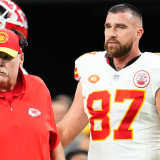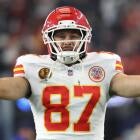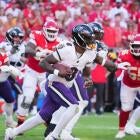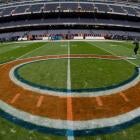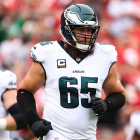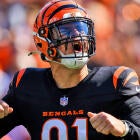
Week 15 NFL Practice Squad Power Rankings 2020: Explosive back Javon Leake can help Washington Football Team
Discussing the mysterious home run hitter the Washington Football Team should elevate for Week 15
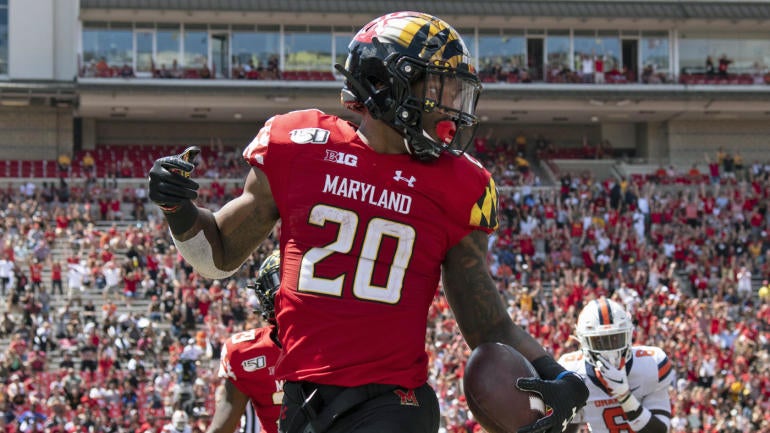
During a four-game winning streak that's catapulted them to the top of the NFC East, the Washington Football Team has featured a fascinating top running back duo -- rookie Antonio Gibson, a former receiver at Memphis who received 33 total carries in his entire collegiate career -- and lightning quick journeyman J.D. McKissic, who's caught 58 passes this season.
But Gibson is hurt. So is depth back Peyton Barber. What in the world should the Football Team do for its ground game in Week 15's matchup against the Seahawks? Remember, this is the Seattle defense that surrendered 190 yards rushing and 6.1 yards per attempt to the Giants just two weeks ago.
What Washington needs to do is call up Javon Leake, a enigmatic missile on the field, from their practice squad. Yes, they just signed veteran Lamar Miller to their active roster. But Leake is as explosive as they come and could provide the team with the one or two big plays needed to spring the upset.
Why is Leake an "enigmatic" rocket? Glad you asked. He only received 145 carries across three seasons at Maryland, a sign on the surface that, either, he was an oft-injured player or just not someone the coaches felt deserved to be prominently featured.
But all Leake did was accumulate 1,144 yards on those opportunities, meaning he averaged a monstrous 7.9 yards per rush in college. The dude scored a touchdown every 8.5 carries as a member of the Terrapins. That sounds like make believe. It's not.
On those 145 totes, 13 went for 25+ yards. That's hilarious. And, Leake had five rushes of 50-plus yards, all of which went for touchdowns.
Say what you want about a running back needing to be an effective pass catcher to truly be valuable in today's NFL. If he can't be a quasi-slot receiver, how about having the ability to score anytime he touches the ball? I'll take a two-carry, 75-yard outing from my practice squad call up any day of the week.
Then, at 6-foot and 215 pounds at the combine, Leake ran 4.65. Here's a link to my facial expressions before and after he ran. To this day, I have never been as sure there was an electronic malfunction in the 40-yard dash as I was in the moment after Leake crossed the line.
He's simply much faster on the field than in shorts and a form-fitting cutoff. Do the smart thing, Washington.
We had a call up in Week 14 -- the Jets elevated wideout Jaleel Scott for their ultimately brutal showing against the Seahawks. However, the longtime PSPR member had a grab for 16 yards in the 40-3 defeat. And on Monday, December 14, the Broncos snagged Parnell Motley from the 49ers practice squad. Thanks for looking to us, Elway. Motley's been on the PSPR for weeks. For those keeping score at home, the PSPR tracker now reads 36 call-ups, and we very well could see more call-ups over the weekend.
This year, I'm only including practice squadders who are rookies, second-year players, or third-year players. That's it. And it aligns perfectly with my niche area of expertise because the 2018 draft class is the first I fully evaluated as CBS Sports' NFL Draft analyst.
And as you'll see below, I couldn't resist ranking more players, given the increase in practice squad sizes this season. To run parallel with the league's figure, I hope to write about 16 individuals every Friday, 10 officially in the rankings and six honorable mentions.
1. Deandre Baker, CB, Chiefs
Last week's PSPR cover guy may take another week or two to learn the nuances of the Chiefs' scheme, but he's as talented as anyone in Kansas City's cornerback room and will be fresh for the latter part of the regular season and playoffs, a nice boost for Steve Spagnuolo's defense if the coordinator decides he needs it.
2. Dane Jackson, CB, Bills
Jackson's back on Buffalo's practice squad and deserves this high ranking due to the solid play he turned in for the Bills during his stint on the active roster. In four games -- two starts -- the 2020 seventh-round selection had 12 tackles, one fumble recovery, a pick and three pass breakups. He can play outside or in the slot and only missed one tackle.
3. Jaleel Scott, WR, Jets
The Jets should completely be in play-young-players mode, and Scott is only in his third season. He really hasn't gotten a chance to play much in the regular season either. Originally a fourth-round pick by the Ravens, he essentially had a redshirt year to get stronger as a rookie, then in Year 2 led the Ravens in receiving during the preseason. Scott is nearly 6-5 and 218 pounds and excels when he needs to extend to make a catch outside his frame.
4. Hakeem Butler, TE, Eagles
Mr. Butler is back on the Eagles practice squad after two weeks on the 53-man roster and just one target to show for it. He's a tight end now, so there should be better matchups for him against linebackers and safeties inside of ultra-twitchy corners who can stay in his hip pocket. Philadelphia's getting healthier now at receiver and tight end, but I still believe Butler can make plays after the catch and when Jalen Hurts simply throws it up to him.
5. Will Clapp, C, Saints
Clapp was my No. 107 prospect in the 2018 class after a long and reliable career at LSU with the Tigers. A mostly poor combine led to a drop to the seventh round. His film was clean as a whistle. I gave New Orleans an "A" for grabbing him as offensive line depth at No. 245 overall, writing the following in my live draft grades: "Very experienced, more of a technician than spectacular athlete. Sturdy against bull rushes. Can be susceptible to counters. Accurate at the second level."
6. Alex Taylor, OT, Browns
Football talent runs in Taylor's family. One of his uncles is former NFL defensive back Pierson Prioleau. Another is Joe Hamilton, a former Davey O'Brien award winning quarterback at Georgia Tech who was picked in the seventh round of the 2000 draft. In a strange genetic twist, Hamilton is only 5-10.
7. Javon Leake, RB, Washington Football Team
Now you know all about Leake, former backfield mate of Ty Johnson and Anthony McFarland. He's kind of a straight-line back, not routinely capable of sinking his jumps and cutting laterally to avoid a tackle, but if the blocking is good -- Look. Out. He is a home run hitter of the 1998 Sammy Sosa variety.
8. Sewo Olonilua, RB, Cowboys
I'm throwing Olonilua here because he's a large, athletic back who deserves some burn down the stretch for the Cowboys. At 6-3 and 232 pounds, he had a vertical in the 70th percentile and a broad jump in the 80th percentile at the combine. While never a star at TCU, he demonstrated the ability to make defenders miss well for a big back when he wasn't running through them. I'd like to see him be the hammer to lighten the workload for Elliott over the next two months.
9. Deon Cain, WR, Steelers
Will the Steelers suddenly give a former late-round pick who's been on the practice squad most of the season a chance to show he can catch a football as the team tries to hang onto the No. 2 seed in the AFC? Probably not. But, heck, it wouldn't be the worst idea, and Cain is an explosive player who tracks it well and can play on the perimeter.
10. Mike Love, EDGE, Bills
I remember watching Love late in the 2018 pre-draft process and loving what I saw. The summary of my evaluation of him was as follows "strong, well-built defensive end with good suddenness but not the ability to sustain speed chasing from the backside. Uses his relatively heavy hands well as a pass-rusher and when shedding against the run." And Love had seven pressures in three preseason games in Buffalo last year. Buffalo has a collection of edge rushers in front of him who play in a heavy rotation, but if there's ever a need at the position, Love can produce in a limited role.
Honorable Mentions
LeVante Bellamy, RB, Broncos
Bellamy just made my Top 250 in the 2020 class (No. 243 overall), and it's perfectly clear why the Broncos signed him after he went undrafted -- he's eerily similar to Phillip Lindsay. In that Big Board article, I wrote: "Bellamy from Western Michigan truly is a burner yet possesses a smaller frame." He only ran 4.50 at the combine, but I do not for a split second believe he's a 4.50 guy on the field. No way. He had runs of 47, 55, 73, and 75 yards last year and averaged more than seven yards per carry in his first four years at Western Michigan. While not as twitched-up nor as powerful through tackle attempts as Lindsay, Bellamy can fly.
John Molchon, OG, Buccaneers
The Buccaneers just aren't the same when Ali Marpet isn't on the field. The veteran guard is one of the better players at his position and Tampa's depth behind him has been disastrous in relief appearances this season. I'm not insinuating Molchon absolutely would be better than the previous Marpet replacements, but it might be worth it giving him a shot at this point.
Rodney Clemons, S, Chiefs
Clemons was a late watch for me and instantly found himself inside my Top 175. Talk about coverage range and ball skill as a safety, Clemons has both, and they were on full display in a very productive career at SMU. After three interceptions and 18 pass breakups in his first three years with the Mustangs, Clemons hauled in four picks and defended nine passes as a senior. In my notes I wrote "keenly aware of route concepts and where the next progression may be, so he routinely finds the football."
Duke Williams, WR, Bills
Williams was signed by the Bills in early January of 2019 to one of those futures contracts that are almost always overlooked and lead nowhere. But the physical rebounder made the team, scored a game-winning touchdown in a vital win over the Titans in Tennessee and had four catches for 49 yards in Buffalo's playoff defeat at the hands of the Texans. He can play and saw his first action -- albeit very limited -- in Buffalo's Week 7 win over the Jets. But no targets.
Anthony Johnson, WR, Steelers
Johnson went from the completely-loaded-at-receiver Buccaneers to the super-deep-at-receiver Steelers, circumstances that haven't helped him get an opportunity to see the field in an NFL team. Now's the time. As for his college career at Buffalo -- Johnson caught 133 passes in two seasons with a 17.8 yards-per-catch average and scored 25 touchdowns.
Prince Tega-Wanogho, OL, Eagles
Early in the 2020 pre-draft process, there was an early-round buzz for Wanogho. Injuries led to a precipitous fall to the sixth round, but the tools are there for the Nigeria-born former Auburn star to ultimately be the bookend tackle to Andre Dillard in Philadelphia, a club that's been outstanding at the tackle positions for a while now. Wanogho plays with requisite knee bend, so he's not easily fork-lifted by smaller rushers, and he's explosive off the snap and in the screen game. With better punch timing and added weight, he can be a consistent pass-protecting tackle in the NFL. This season, he'd mostly be useful getting to the second level in the run game.


